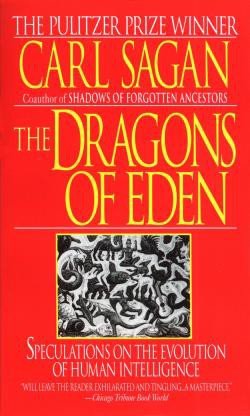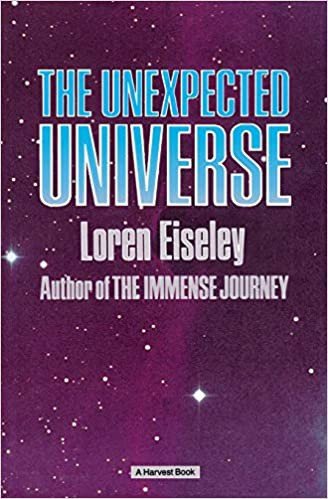Six Science Books That Changed My Life. They Could Change Yours Too.
A few months ago, after the release of my fifth literary science book, Immortality, Inc. — Renegade Science, Silicon Valley Billions and the Quest to Live Forever for National Geographic, The Week magazine asked me to suggest six of my all-time favorite science books. I could have come up with dozens, but these six are timeless, and the ones I feel have had a profound effect on me. I’ve expanded the original article here. I hope you find them useful.
Dragons of Eden by Carl Sagan (1977)
Few thinkers combined eloquence and science more effectively than Carl Sagan, which is one reason why he won the Pulitzer Prize for this remarkable book about the evolution of human intelligence. When I first read the book, passage after passage stopped me cold, and revealed to me how science and writing could be fused in a way that made me see the world and myself in utterly new and profound ways. Sagan had a talent for inspiring you intellectually and emotionally. Something I try to aspire to in my books. He is the master of the ah-ha! moment, the kind of insights that differentiate good science writing from great science writing.
The Medusa and the Snail by Lewis Thomas (1979)
Lewis Thomas once wrote that he was “permanently startled by the realization we are a social species.” A scientist who headed the Memorial Sloan-Kettering Institute, this book of essays won Thomas his second National Book Award. His special knack was his ability to reveal the central themes of human behavior by telling stories about cells and ants, mitochondria and symbiosis. How he manages this is still a mystery to me, but I guarantee you won’t be disappointed when you read his witty and moving essays. Somehow he manages in every one of them to be both light and profound, engaging and startling.
The Blind Watchmaker by Richard Dawkins (1986)
This book picks up where Dawkins’ previous paradigm-shifting book The Selfish Gene leaves off. It reveals the profound power behind the DNA that long-ago came into existence and makes us, and all of life, possible. He is a scientist and writer who understands the forces and complexities of evolution — which he calls the blind watchmaker — intimately, yet has the lucidity of mind and phrase to make his writing utterly accessible to anyone who opens the page. It is dense with science and insight, but never suffocating.
The Unexpected Universe by Loren Eiseley (1969)
No writer of science has ever strung words together more fluently than Loren Eiseley. In this book of essays he’s at the top of his game: authentic, moving, incandescent. An anthropologist that Ray Bradbury described as “every writer’s writer and every human’s human,” he threads the origins of our humanity into essays that are almost mythic in their power, and, at their best, deliver a level of knowledge and wisdom and emotion that at first smolders, and then ignites your mind, forcing you, sometimes, to put down what you’re reading because you are simply floored.
Microcosmos by Lynn Margulis and Dorian Sagan (1986)
Lynn Margulis changed the science of evolution with her insights into microbiology and ecology. Her symbiogenesis theory utterly changed those fields, and brought them into mainstream science. She was also a profound thinker and writer, later co-developing the Gaia Hypothesis, which holds that planet earth acts as a single, living organism. With her son Dorian Sagan (she was Carl Sagan’s first wife), Microcosmos tells the little known story of the first 2.5 billion years of life on earth when the only living things on the planet were single cells, organisms that would be invisible to us (if we were there to see them), yet so powerful they reshaped a planet, and made us possible. It was during that long epoch, Margulis writes, that all the hard, fundamental work that led to us was invented — sex, cooperation, eating, breathing, reacting. In the end we see how these primeval forces drive all of Earth’s vast ecosystems, and reveal that every living thing on the planet, or created by it, is, in fact, one great and vibrant organism, made possible more because of cooperation than competition.
The Man Who Mistook His Wife for a Hat by Oliver Sacks (1970)
Reading Oliver Sacks’ books is like reading a series of great Sherlock Holmes mysteries, except his are about unmasking the riddles of the human mind, not murders. Everyone of them is exceptionally engaging and well-written. He was a neurologist who met fascinating people in his work. The stories he tells about the people he meets, and helps, (always his own patients) are told with such warmth and insight that you fall in love with him, and every person he writes about. They are touching and revealing, yet never clinical or arrogant. Once you open the page, you’re hooked, and then it’s time for another story. He is quite simply a master story teller.
If you are interested in my science books, please feel free to explore them at www.chipwalter.com/books. Throughout the website, you can get all the self-aggrandizing information you want :-): awards and publications in multiple languages and kind reviews in publications like the New York Times, New Yorker, Salon.com, the Wall St. Journal. If you have an interest, visit my blog for more information. And visit my expanding photo gallery of the places I’ve been lucky enough to visit for the documentaries I’ve produced and the books and articles I’ve written for National Geographic Magazine, The Economist, Scientific American, the Wall St. Journal and other publications.






